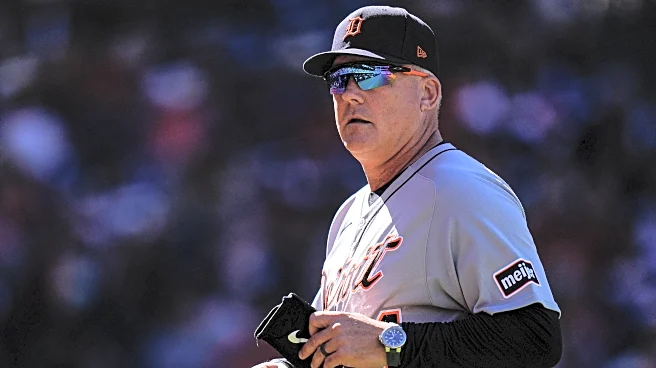The Detroit Tigers and Cleveland Guardians locked up for another tense, low scoring game for most of Wednesday’s Game 2 of the American League Wild Card round. Once again, the Guardians struggled to get
anyone on base for most of the game before finally erupting for five runs in the eighth. The Tigers had much less trouble in that regard, racking up seven hits and six walks, but their hitting with runners on base was atrocious again.. Those struggles will have cascading effects for Game 3 as A.J. Hinch used his bullpen pretty aggressively looking to put the Guardians away.
It was deja vu all over again right from the start. Parker Meadows opened the game by singling through a diving Brayan Rocchio at second base. Rookie outfielder Chase DeLauther, making his major league debut in the postseason, then dropped Gleyber Torres shallow fly ball to center field. The Tigers had two on, no out right from the jump and they blew it.
Tanner Bibee dropped a called strike three on Kerry Carpenter with a high curveball. Spencer Torkelson was lost swinging through a cutter on the outer edge, a fastball at the top of the zone, and then a belt high cutter right down the middle. Riley Greene swung under two fastballs and then tipped a floating changeup at the top of the zone into catcher Bo Naylor’s glove.
First two runners of the game on base, and the heart of the order couldn’t even put a ball in play.
We can get into all the painful detail below, but it’s all small potatoes compared to the Tigers collapse in run scoring over the last month. The Tigers were the sixth most productive team in baseball this season with runners in scoring position. But over the last 30 days they’ve just fallen apart. They aren’t hitting for power and they aren’t driving in runs. It can’t go on like this forever, but they’re now out of time. There’s nothing in their two postseason games to suggest they’re going to wipe the slate clean and get it together.
In Game 2, manager A.J. Hinch used his bullpen aggressively, perhaps too aggressively, expecting his offense to eventually come through. Instead they went 1-for-15 with runners in scoring position. There’s just no getting around that. Managing the pitching staff differently might have averted the full on collapse of the eight inning, but if you can’t take a lead when your pitching staff gives up one run over seven innings, you’re not winning many games in October.
Failure to score
In the top of the third, a two-out single from Gleyber Torres was followed by a wild pitch to get him into scoring position. Kerry Carpenter popped up a cutter right in his wheelhouse down on the inner third to end the inning.
Maybe the worst part of all this is that the Tigers weren’t even chasing here. The approach against Tanner Bibee was pretty good. They swung at strikes but came up empty.
That continued in a decisive fourth inning. Riley Greene doubled to right with one out. Wenceel Pérez got an 0-1 cutter down in the zone but right over the middle and grounded out to first as Greene moved to third. Dillon Dingler and Zach McKinstry put together good at-bats and didn’t chase either, both drawing walks to load the bases. Javier Báez once again showed his younger teammates how it’s done against good stuff in the postseason and stayed within himself, spanking a hard ground ball back up the middle.
We all know what happened next. Greene scored, but Zach McKinstry followed the Tigers aggressive baserunning approach and tried to go first to third in the rookie DeLauter’s face. While initially ruled safe and Dingler into score, that call was controversially overturned and Dingler’s run didn’t count as the inning ended on the play and the Tigers’ catcher was still two steps from home plate. After the game, McKinstry acknowledged that he thought he was out, so while it was frustrating, apparently the replay room got that call right.
Mize gets the hook
So we had a tie game, and when Casey Mize walked Jose Ramirez to open the bottom of the fourth, A.J. Hinch began to manage as though the Tigers had a slim lead and he was going to pull out all the stops. After talking about letting Mize run as long as possible, the hook came very quickly instead.
It was certainly true that Mize was spraying the ball. His splitter wasn’t drawing whiffs and most importantly, his fastball command was the worst its been since August. Still, he’d allowed a solo shot to George Valera in the first inning, and two walks at that point. Hinch came out with the quick hook anyway, putting the onus on his bullpen to get 18 outs.
His reasoning was obvious, though certainly debatable, as Tyler Holton came out of the pen. Hinch had clearly prepped his bullpen to expect to get in the game early, and Mize’s mediocre command convinced him that he needed to snuff a potential rally after the leadoff walk to Ramirez with two left-handed hitters coming to the plate. And it worked. Holton quickly got the double play ball from Manzardo and cleaned up the inning with ease.
The problem is that the Tigers bullpen isn’t really built for this. A lineup full of lefties is not their strength in matchups with only Holton and Brant Hurter as lefties in the pen. Beyond that, they just don’t have enough good relievers to expect to get 18 outs in a tight postseason game. Hinch managed like he had some other more dependably deep bullpen, and he did not have such a bullpen.
The Tigers got a two-out single from Carpenter and then a walk drawn by Torkelson in the top of the fifth, and it looked like the ploy might lead to a lead. Instead, Riley Greene lined out to center field, and Holton took the mound again, pitching a scoreless fifth and then getting Steven Kwan to open the sixth.
Ultimately the early hook for Mize and letting Holton get seven outs worked out pretty well, but it still left the Tigers bullpen short-handed. Kyle Finnegan closed out the sixth for Holton and tossed a 1-2-3 seventh.
The part of the plan that failed was the expectation of having a lead to work with after using Holton to shut the Guardians down for most of a full turn through the lineup. Holton was very efficient, needing just 31 pitches, and so he should be available in Game 3 to pitch an inning, but they aren’t going to be able to ride him for multiple innings in relief of Jack Flaherty on Thursday either. Hinch managed this one as though he had a lead to hold, but the offense didn’t do their job and deliver one. The Guardians took heart as the Tigers stranded two runners in the sixth, and then two more, with no outs no less, in the seventh. There were so many opportunities to put a weak hitting Guardians squad on the ropes, but the Tigers threw pillows instead of punches.
One last shot to score before disaster struck
That top of the seventh saw Gleyber Torres’ jersey clipped by a Hunter Gaddis offering to start the inning. Carpenter singled up the middle and Torres took third on the play. Again, the Tigers were doing a lot of things right here, but as soon as they had ducks on the pond, their hitting computers blew up.
Torkelson got an absolute meatball but instead of just squaring it up, he tried to hit it to Venus and instead lifted a shallow fly ball to left not deep enough to score the run. Stephen Vogt turned to lefty Tim Herrin to finish the job. Hinch stayed aggressive, pinch-hitting Jahmai Jones in for Riley Greene rather than simply trusting Greene to be the hitter we saw in the first half. This was another all-in sort of move, but understandably Hinch didn’t want to end up with his hottest hitter never getting into the game. That was Jones spot, but he struck out. They simply didn’t give him anything to hit out of fear of his propensity to crush left-handers and Jones laid off one curveball that could’ve been called ball four. The next one in the same spot he had to offer at, and he whiffed.
Lefty Tim Herrin then just blew Wenceel Pérez away with fastballs over the plate and the outfielder could do nothing but foul a few off. I would argue that pinch-hitting Jones for Pérez would’ve made more sense, but Hinch didn’t even elect to pinch-hit Andy Ibáñez for a badly struggling Pérez either. Pérez typically does hit better right-handed, and it probably didn’t matter as Ibáñez has been terrible this year. But if Ibáñez can’t pinch-hit against a lefty one has to look to Scott Harris again and wonder what he’s even still on the roster for. AJ Hinch is working with a bench of Jahmai Jones and three other guys who shouldn’t really get into a game unless something bad happens.
Ibáñez then took the field at third so that McKinstry to move out to left field rather than playing Jones out there. That’s not much of a role on a playoff roster.
Bullpen runs out of gas in the eighth
Predictably, when you have scoring chances in six of the seven inning to that point and score one run, the opposition takes heart. Troy Melton ended up tagged with the loss after giving up a solo shot to Brayan Rocchio on a 100 mph fastball. Rocchio holds a miserable 77 wRC+ with five homers in 383 plate appearances on the year. He barely qualifies as a major league hitter, and yet like everything for the Guardians over the last three weeks, it’s all going their way. Doubles from Kwan and Schneemann followed, and ultimately Melton was charged with four runs and the loss after Brant Hurter came on and surrendered a three-run wrist shot out to right off the bat of Bo Naylor.
Why was Troy Melton in the game facing four straight left-handed hitters leading up to Jose Ramirez? That I can’t tell you. As a starting pitching prospect, Melton has depended on his splitter to help him counter lefties, but he hasn’t had command of that pitch much at all since his promotion back in July.
These are very small sample sizes, but because of the overall chaos of the Tigers bullpen for much of the season Melton actually faced more left-handed hitters than right-handers. His numbers against them look good on the surface, but he doesn’t strike them out at all. His K-rate against left-handed hitters is an atrocious 14.6 percent with a 10.4 percent walk rate. Contrast that with his 26.2 percent K-rate and 6.0 walk rate against right-handed hitters, and his peripheral numbers all say he’s just been lucky against left-handed hitters.
Granted, it was two very poor left-handed hitters in C.J. Kayfus and Rocchio leading up to Steven Kwan at the top of the order, but that would seem to be the perfect spot for Hurter. Instead Hurter only came on to try and clean up the mess when the game had already spiraled out of control. Presumably, had Melton racked up a clean inning, Hinch was planning on turning to Hurter to face Schneemann, Ramirez, and Manzardo in the ninth if the Tigers didn’t get a lead they could turn over to Will Vest. In that scenario, you let Hurter attack Schneemann and Manzardo, who don’t hit lefties much, and you simply avoid allowing Ramirez to beat you, even if you have to walk him to do it.
All the Tigers issues in the second half came home to roost
The other factor, or non-factor, is the lack of effectiveness from Tommy Kahnle. Signed to give the Tigers a flexible late innings option with a good strikeout rate, Kahnle fell apart for the whole middle of the season. While his ERA was good in September, it still looked like smoke and mirrors because the strikeouts had dried up. So instead of the grizzled veteran signed to handle spots like the eighth inning against the back of the Guardians order, Hinch chose the hard-throwing rookie and it went very badly.
You can also point to a roster that has three players in Andy Ibáñez, Trey Sweeney, and Justyn-Henry Malloy who aren’t really playable. The Tigers don’t have a speedy, light-hitting contact guy who can steal a base, or an experienced backup pinch-hitting option with power who crushes left-handed pitching. They have three guys who are basically white flags. Part of that is the loss of Colt Keith as a third base option, pressing McKinstry back into a starting role, but there just aren’t many options for Hinch with this roster. Other than trying to get Jahmai Jones a crack against a left-hander, the rest of his bench is pretty unplayable.
Ultimately, you can pick those late inning decisions apart however you want. It just didn’t work, and needing to hold a tie game late, the Tigers had already used two of their three really dependable late innings relievers and didn’t have a lead.
The fundamental mistake in terms of decision-making may have been pulling Casey Mize after only three innings and the leadoff walk to Ramirez in the fourth. In the moment, Mize did not look very good, but every Tigers fan following the game was no doubt wondering how they were going to get six innings out of this bullpen.
For months we’ve harped on the Tigers long series of mistakes with left-handed relievers this year. At one point or another, they had Andrew Chafin, Matt Gage, PJ Poulin, and Dietrich Enns, and they released them all. Every single one went on to pitch pretty well for another major league team. Not only did Scott Harris cut them all in favor of other options that didn’t work out, he then failed to address it by trading for either a lefty starter who could be flexed into the pen in the postseason, nor another left-handed reliever.
Against a heavily left-handed Guardians lineup, that short-coming bit them a little bit, although I certainly didn’t have Brayan Rocchio crushing a 100 mph fastball from Troy Melton on my bingo card either.
So there’s plenty of blame to go around for what transpired in Game 2. Hinch managed as though he had the horses to get six innings out of this pen, and while it bought them time to build a lead, they blew those opportunities and ultimately couldn’t keep it together in the eighth inning with a converted rookie starter and a lefty middle reliever with the game on the line. In the one moment they should’ve taken the lead, their aggressive first to third policy cost them a run by the slimmest of margins and kept the game tied in a crucial situation.
Game 2 was like watching every fear that has haunted Tigers fans down the stretch show up at the worst possible time. And then the Guardians did their part, with an underpowered lineup once again seizing an opportunity when the Tigers could not.
One last shot to get it together
The Tigers head into a decisive Game 3 with the pitching matchup at least slightly in their favor. Jack Flaherty is better than Slade Cecconi, and far more experienced. Cecconi doesn’t strike out a lot of hitters and is pretty home run prone to boot. Despite going to the bullpen early in Game 2, the Tigers should have everyone available today, but they certainly cannot depend on everyone either.
To win this one the Tigers hitters are going to have to pull themselves together at the plate, use the opposite field, and finally start coming through when it counts. It’s just very hard to have confidence that they’re finally going to break out. It has to happen eventually but there’s no sign that it’s imminent with the season on the line. The Tigers are likely going to need Flaherty to give them at least five strong innings. In an elimination game, it goes without saying that the pressure flips back and forth with a lot of intensity. If the Tigers can get into the sixth with a lead, they should be able to get it to the house, but if you don’t add on against this Guardians team they will never go away.









